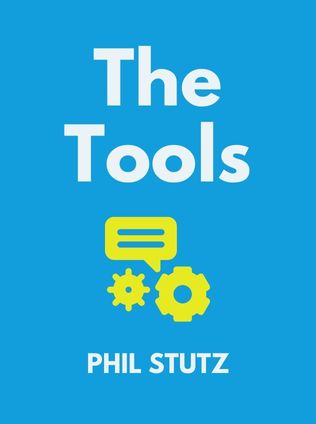
The Tools
5 Tools to Help You Find Courage, Creativity, and Willpower - and Inspire You to Live Life in Forward Motion
By Phil Stutz,
Published 05/2013
About the Authors
Phil Stutz and Barry Michels are renowned figures in the field of psychotherapy, known for their innovative approach to mental health and personal development. Phil Stutz, with decades of experience, has developed a set of tools designed to help patients overcome obstacles and achieve their goals. Barry Michels, a practicing psychotherapist, has integrated these tools into his practice, offering practical and immediate solutions to his clients.
Phil Stutz, a graduate of City College in New York and New York University, began his career as a prison psychiatrist on Riker’s Island. His unique experiences shaped his understanding of human behavior and the need for immediate, actionable solutions. Barry Michels, on the other hand, earned his undergraduate degree from Harvard and his law degree from the University of California, Berkeley. His encounter with Stutz's methods transformed his approach to therapy, emphasizing direct interventions over traditional long-term psychotherapeutic techniques.
Main Idea
The core premise of The Tools is the introduction of five practical tools designed to help individuals overcome challenges, unlock creativity, and live life with purpose. These tools are not just theoretical concepts but actionable behaviors that can be implemented immediately to address common psychological barriers. The tools aim to empower individuals to move forward in their lives, breaking free from the limitations imposed by fear, insecurity, anger, and other negative emotions.
Table of Contents
- The Reversal of Desire
- Active Love
- Inner Authority
- The Grateful Flow
- Jeopardy
The Reversal of Desire
The first tool, The Reversal of Desire, addresses the human tendency to avoid pain and discomfort. The authors argue that this avoidance keeps people trapped in a limited, stagnant life. Instead, they advocate for facing pain head-on and embracing it as a path to growth and freedom.
"The Comfort Zone is supposed to keep your life safe, but what it really does is keep your life small." - Phil Stutz and Barry Michels
The Reversal of Desire is about shifting one's attitude towards pain. By visualizing the pain and actively welcoming it with phrases like "Bring it on" and "Pain sets me free," individuals can shrink the fear and gain the courage to move forward. This technique is exemplified through the story of a football player who achieved success by not shying away from tackles, but by running into them with full force.
Many people, in an effort to avoid pain, resort to self-destructive habits like excessive alcohol consumption, substance abuse, or compulsive internet use. Stutz and Michels describe how these avoidance tactics create a "Comfort Zone" that restricts personal growth and keeps life small. The Reversal of Desire encourages people to actively seek out what they fear, thus diminishing its power and fostering personal courage.
For example, consider someone who is afraid of public speaking. Instead of avoiding opportunities to speak in front of an audience, they can use the Reversal of Desire to visualize the discomfort, embrace it, and mentally affirm their capability to handle it. Over time, this practice can transform their fear into confidence.
- Visualize something you've been avoiding.
- Put the situation out of your mind and focus solely on the pain.
- Repeat phrases like "Bring it on" to diminish the fear and take action.
Active Love
The second tool, Active Love, tackles the issue of anger and resentment, which the authors describe as being trapped in a "maze." This tool is about transcending the immediate feelings of anger and tapping into a higher, infinite force of love, which they call Outflow.
Sign up for FREE and get access to 1,400+ books summaries.
You May Also Like
The Subtle Art of Not Giving a F*ck
A Counterintuitive Approach to Living a Good Life
By Mark MansonRich Dad Poor Dad
What the Rich Teach Their Kids About Money - That the Poor and Middle Class Do Not!
By Robert T. KiyosakiHow To Win Friends and Influence People
The All-Time Classic Manual Of People Skills
By Dale CarnegieFreakonomics
A Rogue Economist Explores the Hidden Side of Everything
By Steven D. Levitt and Stephen J. Dubner



















